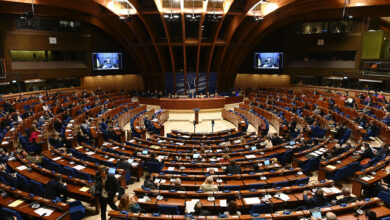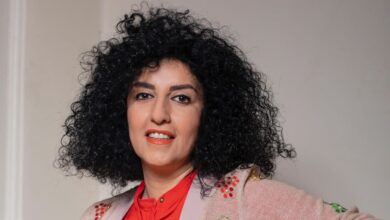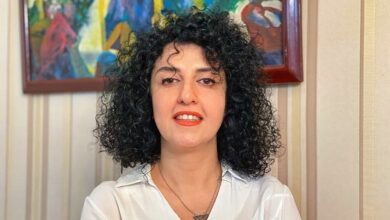Facebook users interviewed Ali Qassem, uncle of slain Alexandrian youth Khaled Saeed, about the details of his nephew’s death and the latest developments in the police investigation. The interview was moderated by Al-Masry Al-Youm’s online community manager, Fathy Abou Hatab. The following is the second part of the interview.
Nersian Omar on Facebook: Will you appeal the tripartite committee’s report?
Qassem: Well, imagine a package two centimeters in diameter and seven centimeters in length, and imagine trying to swallow it. How can one voluntarily try to swallow this? Also, put into consideration that the hashish was wrapped in a nylon package. When nylon gets wet, it gets stuck. I was told that bango (marijuana) is usually wrapped in paper. But apparently it was wrapped in nylon.
According to the forensic reports, which I totally reject, hashish and Tramadol were found in Khaled’s intestines, but not bango. Also, if these police reporters [who arrested Khaled] were experienced in taking illegal drugs off of people, why would they hit his face on a marble table rather than try to get the bango out of his mouth?
The forensic experts said the death was caused by asphyxia, since Khaled swallowed a packet of hashish. Yet these experts haven’t even seen this packet. There are a lot of unanswered questions. We will resort to experienced forensic experts who will work on a parallel report. We will send the criminals to court. We won’t leave the death of our son un-reprimanded, no matter what it takes–even if it means another death in the family.
We will work through Egyptian law and will accept any help from any part of the world. I trust the Egyptian judiciary. The problem is that the judiciary depends in its rulings on the findings of the Interior Ministry. This is what I don’t trust.
Mahmoud Ibrahim on Facebook: Was the picture that circulated after Khaled’s death taken before or after the autopsy?
Qassem: It was taken before the autopsy. Khaled was killed at midnight. He reached the hospital at around that time and was not taken there. He was then taken to the autopsy room to which his brother went at 3:00 AM. We were told that the autopsy took place at 6:00 AM. This picture was taken at 3:00 AM.
You can tell that the anomaly in his face is the product of the internal bleeding which caused excessive swelling. We were also told that there was a wound in the upper and lower lips. If you are doing an autopsy, you need to cut through the chin, which the picture doesn’t show. Then there is blood going out of his head in the picture, which wasn’t staunched, despite the fact that they threw water on him.
After the report, we called for X-rays to be performed. This is totally legitimate. Even the body of King Tut has been subject to X-rays after thousands of years. Finally, I wonder, why is the forensic report so focused on the hashish and drugs? We are not asking them whether our son is on drugs. We are asking how our son was killed.
I want to remind you that people who are on drugs can barely resist any aggression. I wonder why the policemen beat him up when they didn’t even have the right to arrest him.
Al-Masry Al-Youm: Do you think Khaled’s death was premeditated?
Qassem: In her testimony, the doorman’s wife who saw Khaled being beaten up by police heard him saying, “You will kill me!” and she heard the policemen responding, “You will be dead anyway.” This hashish packet is central to the case–it would be a shame to attribute Khaled’s death to it.
Al-Masry: So why was he killed? What about the video circulated online that was claimed to be the reason for his murder?
Qassem: The family has no understanding of why Khaled was killed. But the story we learned like everyone else is that the policeman who took the video of the drug deal at the police station lived in Khaled’s neighborhood. One day, he had been playing with his mobile, and seemingly its Blue Tooth was on without him even realizing it.
Khaled, who was a geek, put it on his computer and started circulating it. When police realized this, they sent reporters to the neighborhood to identify who had spread the video. When Khaled was suspected, he was followed for over a month before he was killed.
The proof that his death was premeditated is that police reporters had no orders to arrest.
Mohamed Adel on Facebook: What can we do to support Khaled’s case?
Qassem: You have to learn a lesson from what happened. Be cautious. You can easily be assaulted in the context of the Emergency Law. I am also pleased by your mobilization and collaboration to express your concern and solidarity with Khaled’s case. You started to feel how much this country needs you.
This is a change, as you didn’t care before. Your stance in this case proves you are honorable young people. We want you to pray for us to be patient and for Khaled to be blessed and forgiven. Keep being active and expressing your solidarity in a peaceful and civilized manner.
This is your country, not their country. You own its present and its future.
Robert Rasmy on Facebook: Which human rights organizations reached out to you and who do you want to address?
Qassem: All human rights organizations have been calling us, especially Mr. George Ishaq, who also attended the prayers we held at the mosque for Khaled. We want to reach out to as many parties as possible. We want to get an official apology to all Egyptian young people for Khaled’s death.
It is no longer our case alone as a family–it’s a case that concerns all Egyptian youth.




